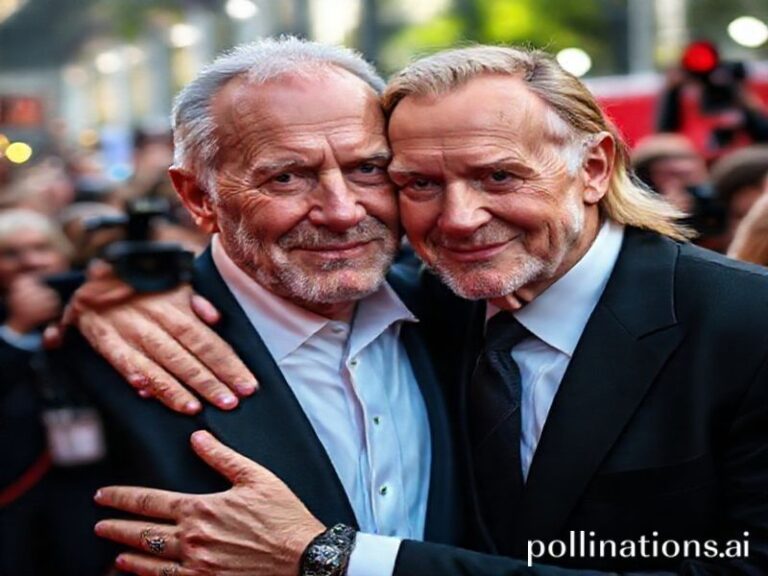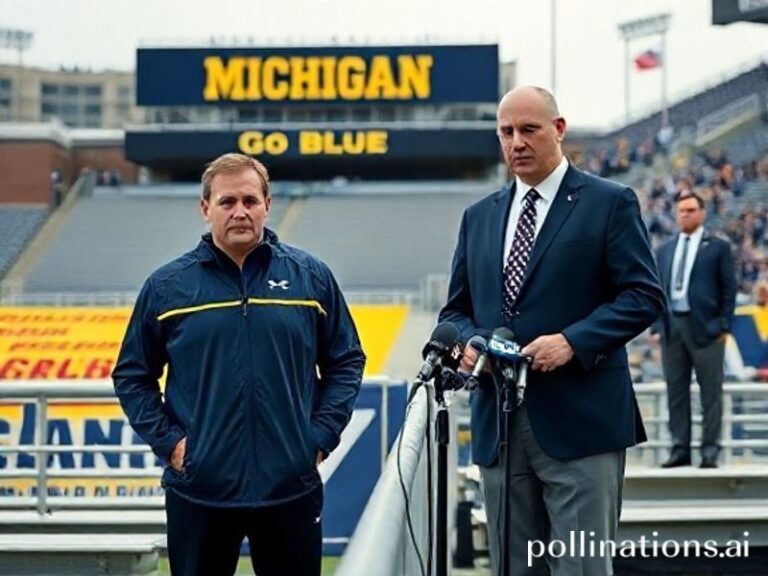Ellen DeGeneres and the Worldwide Implosion of the Nice-Industrial Complex
Ellen DeGeneres and the Global Collapse of the Nice-Industrial Complex
By our correspondent, still scrubbing glitter off the passport
There was a moment—brief, like the lifespan of a housefly in August—when Ellen DeGeneres was the planet’s designated goodwill ambassador. From Lagos to Lapland, schoolchildren learned the verb “to Ellen,” meaning to dance yourself dizzy in front of a studio audience that screams as if each clap might ward off existential dread. Her daytime talk show, syndicated to 171 territories, became a soft-power export more reliable than Boeing and less prone to spontaneous nosedives. Governments listened: when Ellen taped a week of episodes in Melbourne in 2013, Australia’s tourism minister claimed a 200-million-dollar spike in bookings, mostly from Americans who wanted to hug a koala the way Ellen hugged guests—carefully choreographed, left shoulder first, camera right.
Then, like a rerun you swore you’d never watch again, the façade cracked. In 2020 employees told BuzzFeed what life was really like behind the white picket fence: racism, intimidation, and the sort of casual cruelty one usually associates with border-control agencies, not a show whose motto was literally “Be Kind to One Another.” Overnight, the Nice-Industrial Complex—an economy of saccharine tweets, branded compassion, and merch that says “Love Wins” in fourteen languages—suffered a supply-chain rupture. Suddenly the world discovered that kindness, when mass-produced, has the nutritional value of cotton candy and the half-life of a TikTok trend.
International reaction was swift and culturally revealing. In South Korea, where hierarchy is measured in millimeters of bow, local commentators asked how a boss could profess equality while allegedly firing people for taking medical leave. German tabloids ran the headline “Ellen: Die Lügenglocke,” literally “the bell of lies,” apparently thrilled to find another American export that doesn’t meet EU safety standards. Meanwhile, in Brazil, the scandal played out against the backdrop of a raging pandemic and a president who makes Ellen look like Mother Teresa; Brazilians simply shrugged: “We already assumed television was a circus—at least Ellen gave us free tickets.”
The global implications are larger than one comedian’s fall from sainthood. Ellen’s brand of sunshine-drenched liberalism—gay, generous, goofy—was, for two decades, the West’s answer to accusations of cultural imperialism. See? We’re not just McDonald’s and drone strikes; we also export empathy in the form of viral dance breaks. Her show functioned like an arms-limitation treaty for soft power: if you’re laughing at a toddler drummer from Ghana in Burbank, maybe you’ll forget about the IMF loan restructuring that just gut-punched Accra. Once the kindness was exposed as contractually obligated, the entire rhetorical arsenal misfired. The world noticed that the laugh track was canned and the hugs came with NDAs.
The broader significance is that we’ve reached peak performative decency. Every corporation now speaks in Ellenisms—rainbow logos in June, solemn hashtags after mass shootings—while supply chains remain drenched in Uyghur cotton and Amazonian ash. The scandal didn’t kill niceness; it simply revealed it as another tradable commodity, like cobalt or carbon credits. Ellen’s production company, once the moral equivalent of a UN peacekeeping force, is now pivoting to game shows because nothing says redemption like watching strangers fall into vats of slime for cash. Viewers, jaded and scrolling, have moved on to Korean revenge dramas where the cruelty is at least honest and subtitled.
In a final, delicious irony, the Ellen scandal may have done more for global labor rights than any NGO campaign. Production assistants from Toronto to Tel Aviv are now citing “the Ellen clause” in union negotiations: if the happiest place on daytime TV can unionize, so can your dystopian animation sweatshop. Somewhere a junior producer in Mumbai just whispered, “Be kind to one another” to an HR manager who’s been skimming overtime like froth off a cappuccino, and for the first time, the phrase didn’t sound like a punchline.
Conclusion: Ellen DeGeneres taught the world to dance on camera; inadvertently, she also taught us to read the fine print on the dance floor. The stage lights have dimmed, the band’s gone home, and all that’s left is the echo of a joke nobody quite remembers—except that now we know who wrote it, who wasn’t paid, and that the laughter was, as always, optional.







